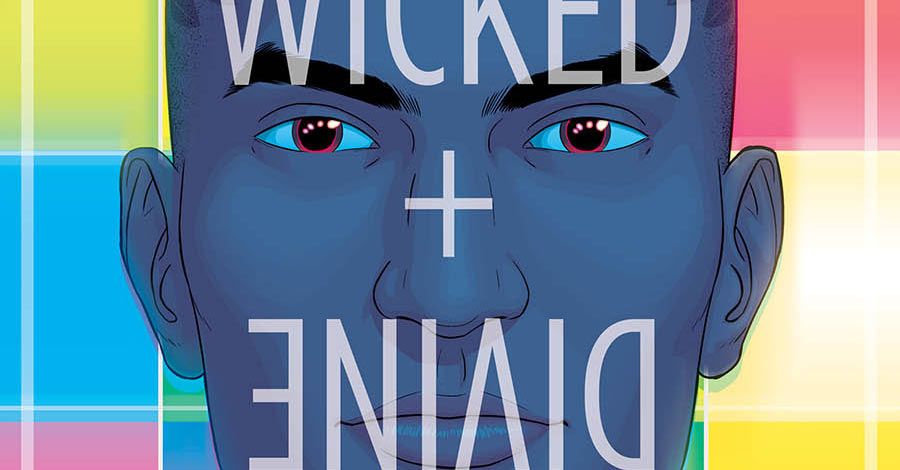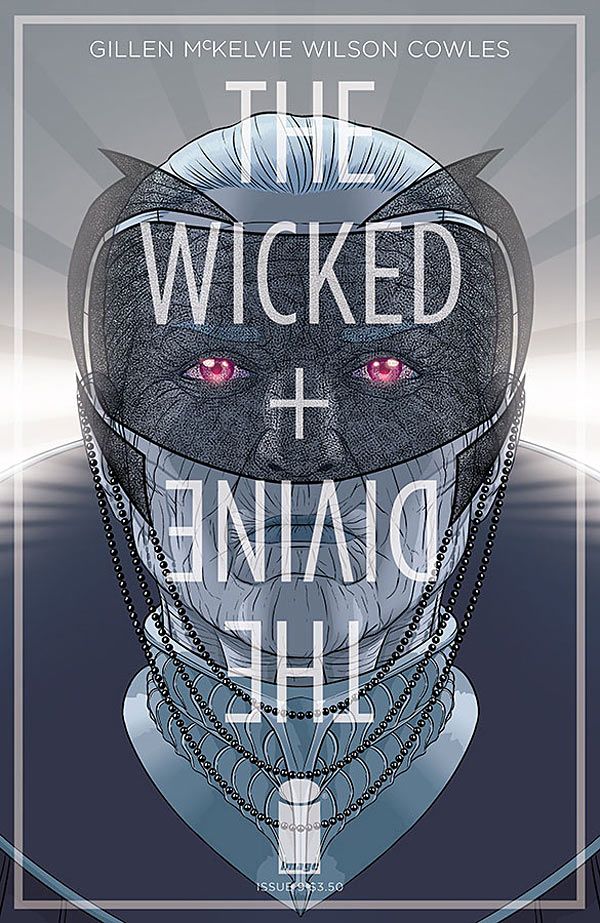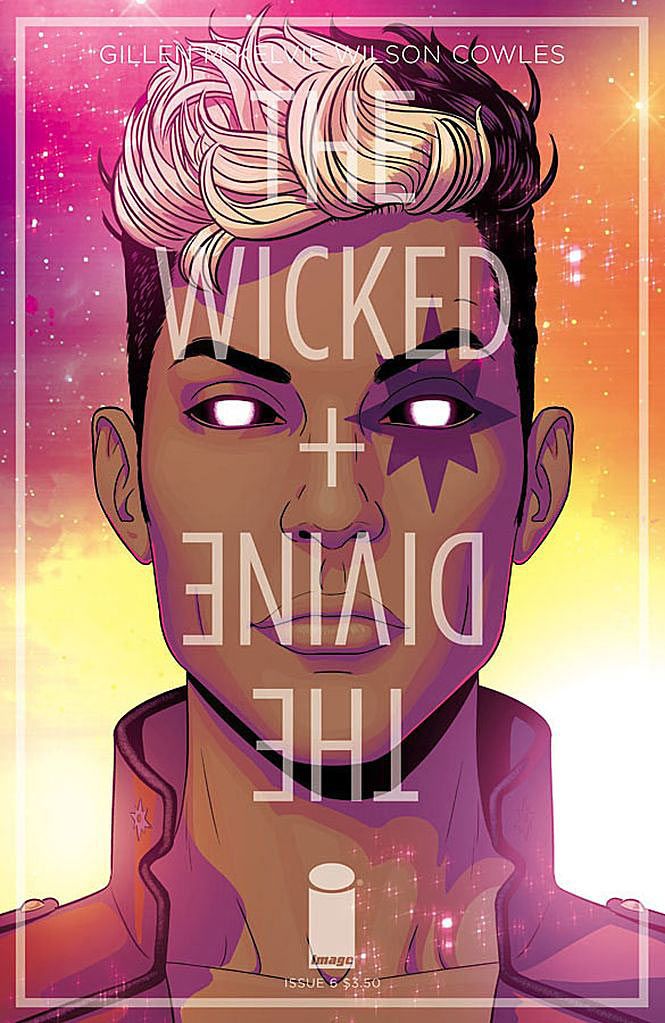Over the past several years, the talented team of writer Kieron Gillen and Jamie McKelvie has delivered some truly original, emotionally stunning comics that have resonated with readers long after they've closed the book. Although both have worked with other creators, their collaboration is magical, birthing characters inspiring love, hate and devotion. And then the bastards kill them off! It just isn't fair.
On the final day of Emerald City Comicon, the team was joined by "The Wicked + The Divine" colorist Matthew Wilson and Comics Alliance Editor-in-Chief Andrew Wheeler, who served as moderator, to give fans an opportunity to look the boys in the eye and ask them to pay for their sins.
Wheeler began the panel by asking a question that's been on everyone's mind for years -- what's it like being a man in the comic book industry?
"It's difficult," Gillen said. "I get stereotyped that people think I'm going to do comics about shaving all the time."

"There's pressure to grow a beard and I just can't," McKelvie added, though it was clear there was no sympathy for their plight from the crowd.
Given their frequent collaborations, Wheeler wanted to know how the duo first met.
"A lot of people in comics met on the Warren Ellis forum in the late '90s," McKelvie explained. "That's where Kieron met Matt Fraction, Kelly Sue DeConnick."
Although McKelvie wasn't reading comics at that point, he soon became a fan after purchasing the first trade of Brian Michael Bendis' "Powers." In the back he saw a URL for the Bendis board, where he met writer/editor Jamie S. Rich. From there visited the Oni Press Board where he met writer Antony Johnston before attending the Bristol Comic Con in 2003.
"I'd just done a short story, photocopied in black-and-white. Antony and the guy that put that together were sharing a table with a games journalist guy, who was trying to get into comics. And it was Kieron."
McKelvie showed Gillen some sample pages and immediately Gillen told him about a story he was working on and wanted McKelvie to draw -- a story called "Phonogram." McKelvie accepted.
"I forgot that I said that," added Gillen." In my head, I didn't say that at all, so I spent the next six months on IM trying to seduce him."
"Phonogram" was published by Image Comics in 2006, but the pair did shorts together for "PlayStation Magazine before that, cementing their inseparable partnership. "Like The Captain & Tennille of comics," Wheeler noted before asking what their collaborative process is like.

"The collaborative process is mainly sexy," said Gillen.
McKelvie added, "He method writes, so he only writes 'WicDiv' in his underwear -- luckily in a different room."
"We're very luck that we've stayed together," said Gillen.
"Are we allowed to swear?" McKelvie asked when prompted to explain each of their best and worst qualities.
"We have English accents, we're always allowed to swear," Wheeler answered.
"I don't know about worst..." McKelvie mused. Gillen encouraged him just to say what he was thinking.
"All right, thinking 'WicDiv' #8 was a normal issue's amount of work. It really, really, really wasn't," McKelvie began, seeming to warm up as he cited Gillen's habit of mis-numbering panels. The artist found it easier to share Gillen's positive traits, like the writer's ability to pen comics that reward multiple readings. "I don't want to say there's short hand in the scripts because they're still very, very, very, very, very, long, but we have a way of working together that we don't have with other people. I understand what he's getting at with a script," McKelvie said.
"Anything he can do in a better way to achieve a better effect, [he has] freedom to do that," Gillen said of his artist. "Every artist has strengths and weaknesses and I always try to write for them, but with Jamie I can do soft, subtle things and he always gets it. People always forget that Jamie is a writer, and if an artist is also a writer, there is a stronger sense of 'interiority' -- about what the story is for and not just what we see.
"Jamie is phenomenally bad at answering e-mails," Gillen continued. "But character design, fashion design -- Jamie could be the Jack Kirby of romance comics, but Jack Kirby was that. I think people are starting to rip him off, which means he's influential. And he's very pretty."
On the subject of character design, Wheeler noted McKelvie's significant contributions, both in his creator-owned work and for Marvel Comics.
"It's not so much about making it my own as it is paying attention to who the character is," McKelvie explained. "Taking their personality and history into account, and that it's represented in their costume -- it shouldn't just look cool, it should be that character."
Turning to Gillen, whose characters are often full of depth, Wheeler inquired how he could make someone like Loki, with an established history, a fresh character.
"For me, it's various levels of attack. The first thing I know about a character is how I'm going to kill them," Gillen said, as the audience murmured displeasure at the memories of beloved characters who fell at his hand. "As in, what is the point of this character, what are they for. What am I trying to show? That's the character. There's a level of literary bullshit, to use the proper term. It's like symphonic writing."

"I'm by nature a pessimist and by character an optimist, so trying to find ways to carry on in that is literally the core of what I do," he finished.
Turning toward Gillen's work on "Young Avengers," Wheeler asked how he created a team of primarily LGBT characters on a mainstream Marvel book.
"I just kind of did it. I didn't want it to be the press release; it wasn't the point of the book," Gillen said. "I kept that reveal very late because I hope people reread it. I wasn't doing it for sales, and the idea that I was would've driven me mad. We just did it and we got away with it."
Asked if this meant he said everything he had to say about superheroes, Gillen was silent for a moment before breaking into laughter.
"Good question, I don't know. 'WicDiv' has a lot of superhero stuff in it. This book is meant to be me killing a lot of things -- it's about me trying to get over myself. Whatever I'm doing next won't be 'WicDiv," said Gillen. "There are a few things I do that I know I won't be doing after -- like autobiography. I did that in 'Phonogram' and I won't do that anymore. It's starting to annoy me."
Drawing McKelvie back into the conversation, Wheeler noted his beautiful character design for "The Wicked + The Divine's" gods.
"We had the idea midway through 'Young Avengers,' so we started a style blog on Tumblr of anything saw that might be interesting. There are so many influences -- Kate Bush, Prince, Steve Nicks. I like drawing a lot of the real world into things. If you've got a fantasy comic set in the real world, you've got to ground it in the real world as much as possible," said McKelvie. "Mainstream comics spent the '90s being completely incestuous and looking inward, copying off themselves, when before they took from pop culture."
McKelvie's strong aesthetic and sense of style could be seen among the many cosplayers dressed as characters from the series -- from a herd of Lucifers in crisp white suits, to several iterations of The Morrigan in black gowns, to a number of fans in Amaterasu's iconic turquoise and yellow eye shadow. McKelvie's designs are so good, in fact, that they allow room for interpretation without losing the core features.
"You get a lot of artists who just draw crop tops, jeans and t-shirts, low cut jeans with the thong -- they're still doing it. It's not difficult to look outside your window and see how people dress. There are literally blogs on the internet you can go to and see how people dress," McKelvie continued.
For all Gillen and McKelvie do to create a world of memorable faces, Wilson brings stunning vibrancy to the series with his coloring. Wheeler asked if he had a specific color palette in mind for each god.
"It started with the covers," Wilson said. "A lot of the direction I would get was this was a god from a certain culture and this was the color -- and this was before we had pages. It was the first four or five covers, so it was a palette per god sort of thing."
Wheeler turned the panel over to questions from the audience and a line immediately formed down the center aisle as fans queued up. The first question revolved around "Young Avengers" and which characters the creators wanted to focus on had the series continued.
"We got all the issues we wanted," Gillen clarified immediately. "They told us we could carry on and we didn't want to. My hypothetical notes for a second season were thinking more of a superhero flat share, make it fun and grimy and getting their heads together."
Another fan didn't have a question, but wanted to share outrage on a friend's behalf. "He wants to kill Kieron," he laughed.
McKelvie was quick to respond. "There is a line for that and I'm at the front."
Gillen didn't miss a beat. He smiled and shouted, "Come at me, bro!"



